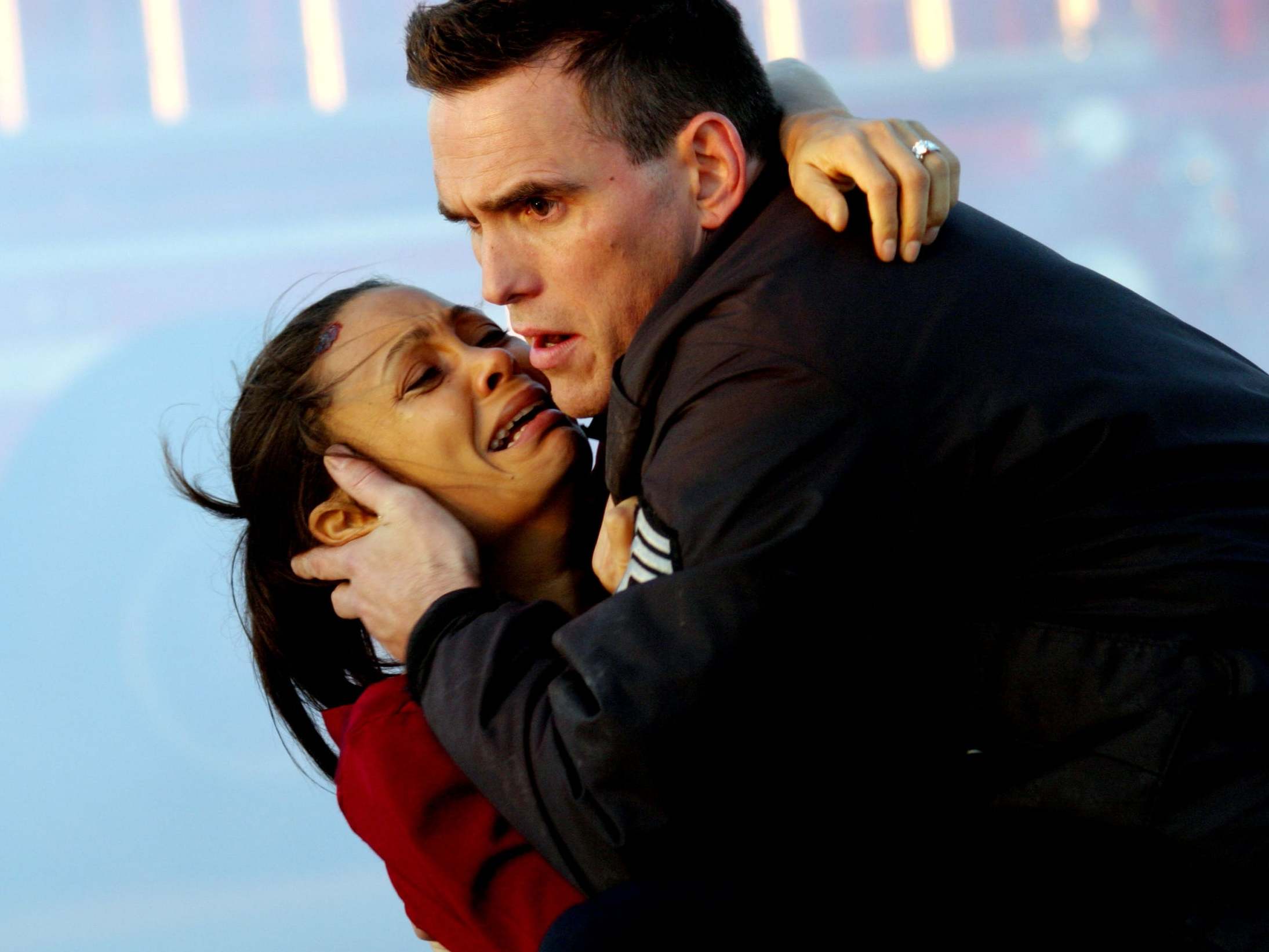Trite, racist and dull: Why the spectre of Crash still haunts Hollywood, 15 years on
The Oscar-winning film is ripe for a roasting thanks to its tone-deaf treatment of race relations. But, asks our chief film critic Clarisse Loughrey, has anything really changed?


It feels like years have passed since Parasite won the Oscar for Best Picture. For many cinephiles, it was the first – and last – good thing to happen in 2020. In an industry so resistant to change, who would have put their money behind a Korean-language satire of capitalism? The Academy had never given the prize to a subtitled film before. It felt like a small miracle. Coupled with Moonlight’s win in 2017 (ignoring the three minutes La La Land was erroneously Best Picture), here was a sign that all of the Academy’s efforts to expand and diversify its membership might actually be paying off.
Except for a recurring problem. In between Moonlight and Parasite’s success, the Oscars saw fit to reward Green Book – a trite, jejune film about how a racist man learns to become a little less racist. It was just like in 1990, when it handed the award to Driving Miss Daisy – a trite, jejune film about how a racist woman learns to become a little less racist. The Academy just couldn’t part with old habits. Namely, the lavishing of praise on films made by white people in order to soothe white audiences by minimising the real scope of racism. And there is no other film in its history more egregious in that sense than Crash, the utterly tone-deaf, cloyingly sentimental ensemble film, which turns 15 this week, and which, in 2006, beat Capote, Good Night, and Good Luck, Munich and, most infuriatingly, Brokeback Mountain to win Best Picture.
Crash adopts a non-linear narrative – one of the major trends of the early Noughties – as it follows a large cast of characters whose lives are all inevitably linked by the ghoulish spectre of racism. Rick (Brendan Fraser), the local DA, and his wife Jean (Sandra Bullock) are the targets of a car-jacking. The perpetrators, Anthony (Ludacris) and Pete (Larenz Tate), drive off in their Lincoln Navigator and end up running over a Korean man. Sgt John Ryan (Matt Dillon), while searching for the stolen SUV, pulls over a wealthy black couple, Cameron (Terrence Howard) and Christine (Thandie Newton), knowing it’s not the car in question. He harasses Cameron and sexually assaults Christine. John’s partner, Tom (Ryan Phillippe), looks on in shock, but doesn’t act.
The film’s treatise on modern racism avoids anything that might make its audience feel uncomfortable or, heaven forbid, complicit. Crash’s characters aren’t relatable. They’re limp puppets, posed in various moral scenarios, with all the unsubtle airs of an afternoon school special. The only two stars able to land something on close to lifelike are Don Cheadle and Michael Pena, playing Detective Graham Waters and locksmith Daniel, who both give off a kind of self-aware world-weariness.
Otherwise, subtlety and thoughtfulness are not the film’s forte. In the Crash universe, you can’t even grab a coffee in the morning without ending up in a slur-riddled showdown with a complete stranger; every single conversation somehow becomes a screaming match about race. The film’s a tennis match of broad, bigoted stereotypes: that Asians can’t drive, anyone from the Middle East is a terrorist, or black people are criminals. There’s zero acknowledgement of how daily microaggressions and systemic racism work in shaping people’s lives. Neither does the film tackle how race, class, and gender intersect. Why is it that John specifically targets black women? Crash isn’t curious to know.
Green Book and Driving Miss Daisy both temper white guilt by suggesting racism can magically be cured over the course of a few car rides (both deal with racial divides between a chauffeur and his passenger, although their races are flipped between the two). Similarly, in Crash, there’s no need to dismantle white supremacy in order to end racism. Everyone just needs to let go of their anger and come in for one giant, multicultural hug. “In LA nobody touches you,” Graham opens the film with. He’s looking out of the window but, really, his gaze is fixed right down the camera lens. “I think we miss that touch so much that we crash into each other just so we can feel something.” Jean discovers that the only dependable soul in her life is her Mexican maid, who she then throws herself at for a snivelling, desperate embrace.

The film’s director, Paul Haggis, has claimed the film is “a fable”. He says he wanted to unleash a deluge of stereotypes, then “start twisting you around in your seat until you’re left spinning”. But there’s no unpacking done here. In fact, the film does almost the opposite. Anthony and Peter are first introduced as they leave a ritzy Italian restaurant. “We’re the only black people surrounded by a sea of over-caffeinated white people and a trigger-happy LAPD,” Anthony raves. “Why aren’t we scared?” Peter’s answer is matter-of-fact: “Because we have guns?” Before we know it, they’ve sprinted up to Rick and Jean’s car. Crash is filled with these kinds of unsettlingly empty provocations. Graham is investigating what seems to be a clear-cut case of racially motivated murder committed by a white cop… until it isn’t.
In the film’s most noxious sequence, John comes to the rescue of Christine, who’s been involved in a collision and is now trapped in her car – mere moments away from being engulfed in a giant fireball. This is positioned as John’s great penance for what he did to Christine. She’s never given the chance to accept it, but is led away in slow motion, as the two share a look of great cosmic significance. We’re meant to understand these people are now profoundly changed. But a racist, misogynistic cop doing their job and showing a single instance of bravery doesn’t automatically stop them from being a racist, misogynistic cop. That’s not how forgiveness works. The framing of this scene is disturbing – even more so in light of the fact Haggis has since faced multiple accusations of sexual assault and misconduct.
By presenting racism as nothing more than a personality issue in need of a fix, Crash absolves its white audience of any sense of collective responsibility. The film exists to reassure them. Its story is based on an incident from Haggis’s own life, when he was carjacked on the way home from seeing The Silence of the Lambs. A decade later, he decided to imagine the lives of the men behind the crime, but he ended up with a thesis on white guilt. Tom proves not to be the ally he presents himself to be and Shaniqua (Loretta Devine), another target for John’s harassment, ends the film screeching the words: “Don’t talk to me unless you speak American!” It’s like Avenue Q’s “Everyone’s A Little Bit Racist” played without a hint of irony. No one here is truly innocent, so no one has to shoulder the blame.
Technically, Crash was the underdog of the 2006 Oscars race. It had been shot for a measly $7m, with some of its cast reportedly taking substantial pay cuts. Haggis had begged Lionsgate not to launch an Oscar campaign – it was surely too small a film, it’d get instantly drowned out. But the studio ignored his request. It sent out 130,000 DVD copies to Academy voters, largely actors. Momentum started to build. When Brokeback Mountain, the initial frontrunner, failed to land a nomination for Best Editing – a standard prerequisite for winning Best Picture – the race was pretty much over.

Homophobia likely played a large role in Brokeback Mountain’s eventual Oscar defeat. The film’s screenwriter, Diana Ossana, claimed in 2015 that the Academy’s “old white male had trouble with it”, no doubt because it challenged the heterosexual homogeneity of Hollywood. Tony Curtis and Ernest Borgnine both publicly refused to see the film. It’s certainly considered to be the better film now. Not only did Brokeback Mountain deconstruct the macho cowboy archetype and offer one cinema’s first mainstream gay romances, but director Ang Lee’s handling of the material is both beautiful and tender.
But it’s worth remembering that the initial reviews for Crash were glowing – it was called “brave” and “daring”, with “the possibility of making their audiences better people”. That was a discourse shaped largely by white critics. It took other voices to come in and deconstruct the film’s clumsy treatment of racism. Only then did the perspective start to shift. In 2009, The Atlantic’s Ta-Nehisi Coates declared: “If you’re white and voted for Barack Obama strictly because he was black, you probably liked Crash.” The Awl’s Natasha Vargas-Cooper called it “a white guilt tract”. You can guarantee Crash is the dad from Get Out’s favourite film. In 2015, the Academy finally seemed to admit it had made a mistake. The Hollywood Reporter asked hundreds of Academy members to re-vote on past decisions. Brokeback Mountain came out on top.
Did Oscar voters really learn their lesson? The last decade or so has been awash with white saviour narratives like The Blind Side and The Help – both now Oscar winners. Three Billboards Outside Ebbing, Missouri was a frontrunner in 2018. White audiences still get to sit comfortably within a white-constructed viewpoint on racism, unchallenged and unbothered. There might be some room for optimism, but the spectre of Crash still haunts Hollywood, shouting matches and all.
Join our commenting forum
Join thought-provoking conversations, follow other Independent readers and see their replies
Comments
Bookmark popover
Removed from bookmarks